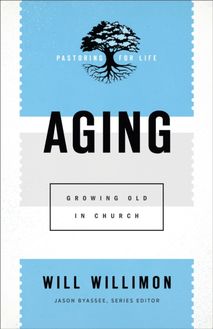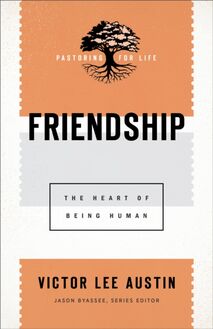Disability (Pastoring for Life: Theological Wisdom for Ministering Well) , livre ebook
98
pages
English
Ebooks
2021
Vous pourrez modifier la taille du texte de cet ouvrage
Obtenez un accès à la bibliothèque pour le consulter en ligne En savoir plus
Découvre YouScribe et accède à tout notre catalogue !
Découvre YouScribe et accède à tout notre catalogue !
98
pages
English
Ebooks
2021
Vous pourrez modifier la taille du texte de cet ouvrage
Obtenez un accès à la bibliothèque pour le consulter en ligne En savoir plus
Publié par
Date de parution
18 mai 2021
Nombre de lectures
1
EAN13
9781493430642
Langue
English
Poids de l'ouvrage
1 Mo
Publié par
Date de parution
18 mai 2021
EAN13
9781493430642
Langue
English
Poids de l'ouvrage
1 Mo
Cover
Half Title Page
Series Page
Theological Wisdom for Ministering Well Jason Byassee, Series Editor
Aging: Growing Old in Church by Will Willimon
Birth: The Mystery of Being Born by James C. Howell
Friendship: The Heart of Being Human by Victor Lee Austin
Recovering: From Brokenness and Addiction to Blessedness and Community by Aaron White
Title Page
Copyright Page
© 2021 by Brian Brock
Published by Baker Academic
a division of Baker Publishing Group
PO Box 6287, Grand Rapids, MI 49516-6287
www.bakeracademic.com
Ebook edition created 2021
All rights reserved. No part of this publication may be reproduced, stored in a retrieval system, or transmitted in any form or by any means—for example, electronic, photocopy, recording—without the prior written permission of the publisher. The only exception is brief quotations in printed reviews.
Library of Congress Cataloging-in-Publication Data is on file at the Library of Congress, Washington, DC.
ISBN 978-1-4934-3064-2
Unless otherwise indicated, Scripture quotations are from THE HOLY BIBLE, NEW INTERNATIONAL VERSION®, NIV® Copyright © 1973, 1978, 1984, 2011 by Biblica, Inc.® Used by permission. All rights reserved worldwide.
Scripture quotations labeled CEB are from the Common English Bible. © Copyright 2011 by the Common English Bible. All rights reserved. Used by permission.
Scripture quotations labeled ESV are from The Holy Bible, English Standard Version® (ESV®), copyright © 2001 by Crossway, a publishing ministry of Good News Publishers. Used by permission. All rights reserved. ESV Text Edition: 2016
Scripture quotations labeled FT are from The First Testament: A New Translation , copyright © 2018 John Goldingay. Used by permission of InterVarsity Press. All rights reserved.
Scripture quotations labeled GW are from GOD’S WORD, a copyrighted work of God’s Word to the Nations. Quotations are used by permission. Copyright © 1995 by God’s Word to the Nations. All rights reserved.
Scripture quotations labeled Jerusalem Bible are from The Jerusalem Bible © 1966 by Darton Longman & Todd Ltd and Doubleday and Company Ltd.
Scripture quotations labeled KJV are from the King James Version of the Bible.
Scripture quotations labeled NASB are from the New American Standard Bible® (NASB), copyright © 1960, 1962, 1963, 1968, 1971, 1972, 1973, 1975, 1977, 1995 by The Lockman Foundation. Used by permission. www.Lockman.org.
Scripture quotations labeled NCV are from the New Century Version®. Copyright © 2005 by Thomas Nelson. Used by permission. All rights reserved.
Scripture quotations labeled NET are from the NET Bible®, copyright © 1996–2016 by Biblical Studies Press, L.L.C. http://netbible.com. Used by permission. All rights reserved.
Scripture quotations labeled NKJV are from the New King James Version®. Copyright © 1982 by Thomas Nelson. Used by permission. All rights reserved.
Scripture quotations labeled NRSV are from the New Revised Standard Version of the Bible, copyright © 1989 National Council of the Churches of Christ in the United States of America. Used by permission. All rights reserved.
Quotations from Amy E. Jacober, Redefining Perfect: The Interplay between Theology and Disability , foreword by Nick Palermo (Eugene, OR: Cascade Books, 2017), are used by permission.
Quotations from Bethany McKinney Fox, Disability and the Way of Jesus: Holistic Healing in the Gospels and the Church , foreword by John Swinton (Downers Grove, IL: IVP Academic, 2019), are used by permission.
Quotations from Rachel Wright and Tim Wright, Shattered: God’s View through Life’s Broken Windows (Farnham: CWR, 2019), are used by permission.
Dedication
For two Agneses. Laura Agnes McFarland, from whom I received the faith I hand on to Agnes Sophia Rose Brock, who had a magic finger before her dad
Contents
Cover i
Half Title Page i
Series Page ii
Title Page iii
Copyright Page iv
Dedication v
Series Preface ix
Acknowledgments xi
Introduction 1
1. Nobody with Disabilities in Our Church 5
2. Jesus Heals Everyone He Meets 29
3. God Chose You Because He Knew You Could Handle It 63
4. Disability Is a Tragic Effect of the Fall 95
5. We Don’t Know Where to Start 135
Afterword 167
Notes 169
Scripture Index 177
Subject Index 179
Back Cover 181
Series Preface
One of the great privileges of being a pastor is that people seek out your presence in some of life’s most jarring transitions. They want to give thanks. Or cry out for help. They seek wisdom and think you may know where to find some. Above all, they long for God, even if they wouldn’t know to put it that way. I remember phone calls that came in a rush of excitement, terror, and hope. “We had our baby!” “It looks like she is going to die.” “I think I’m going to retire.” “He’s turning sixteen!” “We got our diagnosis.” Sometimes the caller didn’t know why they were calling their pastor. They just knew it was a good thing to do. They were right. I will always treasure the privilege of being in the room for some of life’s most intense moments.
And, of course, we don’t pastor only during intense times. No one can live at that decibel level all the time. We pastor in the ordinary, the mundane, the beautiful (or depressing!) day-by-day most of the time. Yet it is striking how often during those everyday moments our talk turns to the transitions of birth, death, illness, and the beginning and end of vocation. Pastors sometimes joke, or lament, that we are only called when people want to be “hatched, matched, or dispatched”—born or baptized, married, or eulogized. But those are moments we share with all humanity, and they are good moments in which to do gospel work. As an American, it feels perfectly natural to ask a couple how they met. But a South African friend told me he feels this is exceedingly intrusive! What I am really asking is how someone met God as they met the person to whom they have made lifelong promises. I am asking about transition and encounter—the tender places where the God of cross and resurrection meets us. And I am thinking about how to bear witness amid the transitions that are our lives. Pastors are the ones who get phone calls at these moments and have the joy, burden, or just plain old workaday job of showing up with oil for anointing, with prayers, to be a sign of the Holy Spirit’s overshadowing goodness in all of our lives.
I am so proud of this series of books. The authors are remarkable, the scholarship first-rate, the prose readable—even elegant—and the claims made ambitious and then well defended. I am especially pleased because so often in the church we play small ball. We argue with one another over intramural matters while the world around us struggles, burns, ignores, or otherwise proceeds on its way. The problem is that the gospel of Jesus Christ isn’t just for the renewal of the church. It’s for the renewal of the cosmos—everything God bothered to create in the first place. God’s gifts are not for God’s people. They are through God’s people, for everybody else. These authors write with wisdom, precision, insight, grace, and good humor. I so love the books that have resulted. May God use them to bring glory to God’s name, grace to God’s children, renewal to the church, and blessings to the world that God so loves and is dying to save.
Jason Byassee
Acknowledgments
Embarrassingly, very few academic theologians have engaged the disability experience in any detail. I am fortunate enough to work in one of the rare departments in the world where this is not true. I have several wonderful colleagues who work on these themes and with whom I can regularly discuss them.
John Swinton is a practical theologian who has had a sweeping influence on the field of disability theology. It has been a privilege to have him take me as a young scholar into the foreign land of disability theology. He has written a range of powerful books on mental illness and the pastoral questions that disability raises for churches.
Grant Macaskill is a New Testament scholar who over the last few years has been thinking increasingly intensively about autism and whose recent book I highly recommend ( Autism and the Church: Bible, Theology, and Community ).
Léon van Ommen is a practical theologian also thinking hard about autism and doing empirical research on L’Arche communities and autism-friendly churches around the world.
Having such colleagues means that I have the privilege of getting to know most of the people working in the field of theology and disability and that I am able to keep up to date with what is happening in churches around the world, disabled advocacy groups, and research networks on theology and disability.
To be a hub of excellence in an academic field also means that a fantastically rich and insightful group of students and fellow travelers become one’s friends. This book was enriched by the preparatory conversations I had with Lorraine Williams, Lynsay Downs, Chantal Huinink, Kirsty Jones, and Bishop Anne Dyer; by the feedback on a draft from Paul Shrier and Jason Byassee; and by the Celtic Anglican bishops on whom I first tested out the squirm-inducing material from the first chapter during their retreat in Inverness in January 2020.
As I spoke about disability to Christians in various parts of the globe, I began to be aware that the incredibly rich and exciting discussion I was having with my colleagues and students had moved far beyond the ways of understanding disability that are common in the church today—and more importantly, what is happening on the ground in churches.
The time had come for me to speak plainly.
This book is an attempt to summarize in the simplest language I can the best of the insights we have discovered over a decade of thinking very hard about the disability experience and what it reveals about God, the world, and the church.
Introduction
Welcome. Gentleness. Presence. Attentiveness. Commitment. This is all Christians need to know about





